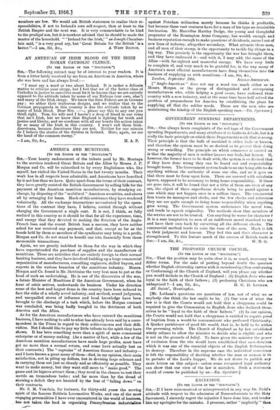AMERICA AND MUNITIONS.
[To sus EDITOR OF TER SPECTATOE.1
Sxa,—Your hearty endorsement of the tribute paid by Mr. Montagu to the services rendered Great Britain and the Allies by Messrs. J. P. Morgan and Co. will be subscribed to by every Englishman who, like myself, has visited the United States in the last twenty months. Their work has in all respects been admirable, and Americans have benefited by it not less than we have. Quito apart from the terms of their contract, they have greatly assisted the British Government by selling bills for the payment of the American munition manufacturers, by steadying ex- change, by disposing of the " mobilized " American securities, and above all by arranging for loans. Much of this assistance they have rendered voluntarily. All the exchange transactions necessitated by the opera- tions of the contract they have, I believe, carried through without charging the Government a single cent. It is not, I think, as fully realized in this country as it should be that for all the experience, time, and energy that they devoted to making the flotation of the Anglo- French loan and the recent British loan a success, they have neither asked for nor received any payment, and that, except so far as the bonds held by them as members of the syndicates may bring in a profit, Morgan and Co. do not stand to benefit one iota financially from those memorable transactions.
Again, wo are greatly indebted to them for the way in which they have superintended the purchase of supplies and the manufacture of munitions. These are activities that are entirely foreign to their normal banking business, and they have involved building up a large commercial organization of manufacturers, consulting engineers, skilled buyers, and experts in the various branches of the .munitions industry. Messrs. Morgan and Co. found in Mr. Stettinius the very best man to put at the head of such an undertaking. He is one of the discoveries of the war, a future Minister of Munitions if the American Government, when its hour of crisis arrives, understands its business. Under his direction some of the best and largest firms in the country have been induced to face the risks of a wholly novel industry, and method, sound judgment, and unequalled stores of influence and local knowledge have been brought to the discharge of a task which, before the Morgan contract was concluded, was being badly bungled to the detriment of both .America and the Allies.
As for the American manufacturers who have entered the munitions business, I have nothing to add to what has already been said by a corre- spondent in the Times in regard to their achievements and their diffi- culties. But I should like to pay my little tribute to the spirit they have shown. It has been something more than a spirit of mere commercial enterprise or of money-making. (As a matter of fact, while a few of the American munition manufacturers have made huge profits, most have got no more than a normal return, and some have actually lost on their contracts.) The " captains " of American finance and industry— and I have known a great many of them—find, in my opinion, their main satisfaction, not in piling up dollars, but in devising large schemes and in carrying them out just as cleanly and as efficiently as possible. They want to make money, but they want still more to " make good." The game and its bigness attract them ; they revel in the chance to test their mettle on tremendous tasks ; and far more than by the dread of showing a deficit they are haunted by the fear of " falling down " on their contracts.
Mr. S. M. Vauclain, for instance, for thirty-odd years the moving spirit of the famous Baldwin Locomotive Works, and one of the most engaging personalities I have ever encountered in the world of business, has not taken the lead in organising Pennsylvanian industrialism
against Potsdam militarism merely because he thinks it profitable, but because these vast ventures have for a man of his type an irresistible fascination. Mr. Marcellus Hartley Dodge, the young and thoughtful proprietor of the Remington Arms Company, has wealth enough and business reputation enough to make questions of dividends, carnal out of new lines of industry, altogether secondary. What attracts these men, and all men of their stamp, is the opportunity to tackle big things in a big way. This precisely is the opportunity the war has brought them, and they have embraced it—and with it, I may add, the cause of the Allies —with far-sighted and masterful energy. We have very little to complain of, and very much to be grateful for, in the way many of America's most efficient manufacturers have flung themselves into the business of supplying us with munitions.—I am, Sir, &c., [" Anglo-American " does not say a word too much either as to Messrs. Morgan or the group of distinguished and enterprising manufacturers who, while helping a good cause, have endowed their country with a new industry, and at the same time have half solved the problem of preparedness for America by establishing the plant foe supplying all that the soldier needs. These are the men who are maintaining the kinship of the English-speaking race.—ED. Spectator.]


































 Previous page
Previous page